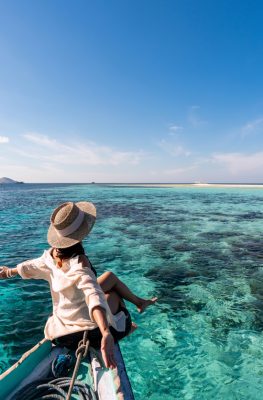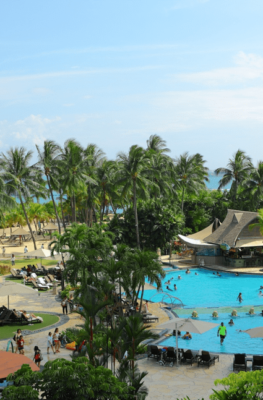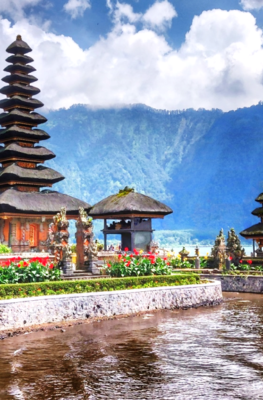Published on October 28, 2014
The newly appointed Minister of Tourism, Arief Yahya, speaking to tourism officials and stakeholders at the recent handing over ceremony said that the three key factors in developing and promoting tourism are : Infrastructure, ICT and Health and Hygiene.
Of the three, the factor that can and should be undertaken immediately is optimizing the use of Digital Technology. Today, we are in the fourth wave of World Civilization, namely that of Culture and the Creative Industry, having moved on from ICT as third wave and Manufacturing in the second wave.
Through joint efforts and an “outward looking” mode, Tourism Minister Arief Yahya is confident that Indonesia’s tourism will achieve the set target of 20 million visitors by 2020. Where the target for 2015 is to welcome 10 million international arrivals, up from an expected 9.5 million this year.
Minister Arief who has been appointed by incoming President Joko Widodo as Minister of Tourism was former CEO of State Enterprise PT Telkom with forte in Marketing.
This is the first time that Tourism is given a stand-alone Ministry as Ministry of Tourism. Previously the Ministry of Tourism has been joined alternatively with Post and Telecommunications, Art and Culture, and the Creative Economy. It is also worth noting that in the new Cabinet Structure, Tourism is under coordination of the Coordinating Minister of Maritime Affairs. Included in this coordination are the Ministry of Transportation, Ministry for Seas and Fisheries, Ministry of Mining, and the Ministry of Tourism
On 28 October Minister Arief Yahya received the transfer of duty from former Minister of Tourism and Creative Economy, Mari Elka Pangestu at an official ceremony held at the Soesilo Soedarman Hall, Sapta Pesona Building of the Tourism Ministry in Jakarta.
Present was former Deputy Minister of Tourism and Creative Economy , Sapta Nirwandar, officials of Tourism Ministry, leaders of tourism associations, thetourist industry, the media and other stakeholders.
In her closing speech as Minister of Tourism and Creative Economy, MariPangestu explained that Tourism is a most important sector having contributed around 2 million jobs in the past 3 years and foreign currency revenue of around US$ 11 billion last year, and is among three top contributing sectors to the national balance of payment, outside oil and gas.
Indonesia is indeed a vast and most beautiful country with immense tourim opportunities. Personally, Mari Pangestu said, that she gained outstanding experiences during her time as the Minister of Tourism an Creative Economy, travelling to all of the wonderful places all over the Indonesian Archipelago. Through these travels she has gained a deeper sense of love and appreciation ofIndonesia and the people. She was also most happy to have worked with the those working in tourism who always seem to be happy, which may be since tourism people work so enthusiasically to make other people happy, she said.
Mari further expressed the hope that the new Minister of Tourism in the “Working Cabinet” will guard and lead Indonesia’s Tourism Programs into the future and maintain this sector as a significant contributor to the country’s economy.
“I believe that Mr.Arif Yahya can take Indonesian Tourism forward especially through the use of technological breakthroughs”.
Earlier, former Deputy Minister, Sapta Nirwandar, said that in 2002 Indonesia’s tourism suffered a heavy blow and sharp decline caused by the Bali bombings. However, in the past decade through hard work and recovery efforts, Indonesia’s tourism has now started to grow significantly.
Tourism as a Top Foreign Income Gainer and Pillar of National Economy
In his first speech, Minister of Tourism, Arif Yahya stated that Indonesia’s Tourism potentials are immense. He explained that new breakthroughs are needed in marketing of Indonesian tourism products, both throughconventional means and through the most up-to-date digital technology. To do this and to remain competitive, Indonesia’s Tourism must keep to international standards.
“We need to look outwards. To do that indonesia’s tourism needs to be based on international standards These standards will center on 4 key aspects, these are : infrastructures, ICT (Information and Communication Technologies), health, and hygiene” stated Arirf Yahya.
Specifically, Arirf Yahya explained that with breakthroughs in digital technology, Indonesian Tourism can be elevated as a prime world destination with high competitive value. The current age of digital technology is regarded as the most efficient and economic for tourism promotion with rapid and wide reach.
Arief Yahya further emphasized that the ministry needs to map out the Top10,20, 50, and 100 destinations in Indonesia to attract the number of 20 million international tourists by 2019 or double the number of international touristsfrom 9.5 million in 2014. Various efforts including promotions, increasing accessibility, and flight connectivity from various country origins to top destinations all over the Indonesian Archipelago will also need to be continuously enhanced.
Minister Arief Yahya was born in Banyuwangi, East Java in 1961. He is an electric engineering alumni of Bandung’s Institute of Technology, and has a Masterdegree in Telematics from Surrey University in England. He also received manyaccolades and acknowledgments such as the Economic Challenge Award 2012 inthe Telecommunications industry category, Business Review Award Business Review Magazine, and The Best innovative CEO of State Owned Enterprises(BUMN) 2012.
Under President Joki Widodo and Vice President Jusuf Kalla, Arief Yahya as Minister of Tourism will carry out the duty to establish Tourism as top gainer of foreign currency income and a significant contributor to the national economy.
“We will be focusing on tending to what we are lacking, and also to reach the short term target of 10 million international tourists, and the long term target of 20 million tourists” Stated Minister Arief. For the past 3 years the average growth of international tourists’ number to Indonesia is 8%. In future, the number is expected to grow to 12% so that foreign currency revenue can significantly increase. By 2020, with a target of 20 million international arrivals, foreign currency income from Tourism is estimated to reach US$24 billion.






